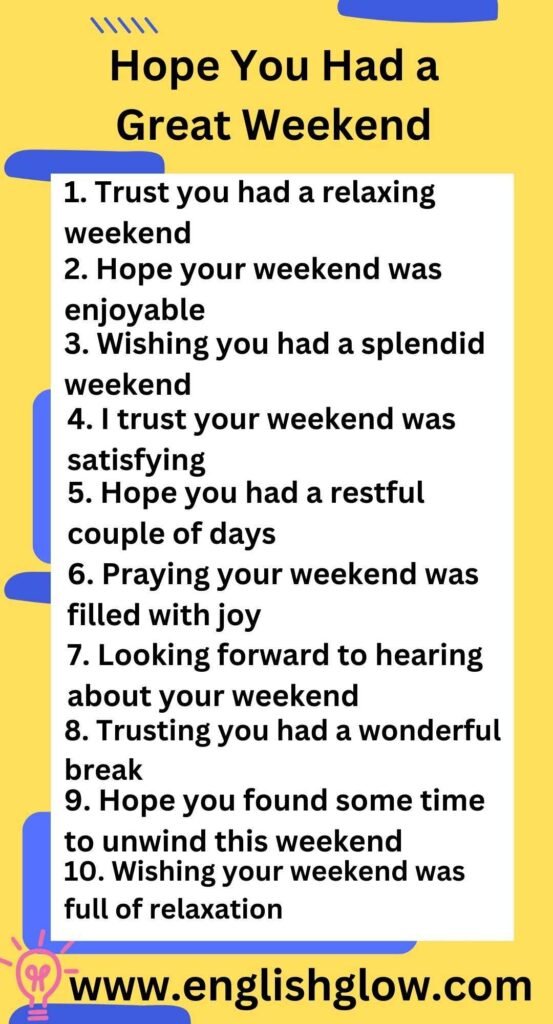Starting an email with a warm and cordial tone can set the right mood and make communication more engaging. Instead of always saying “I hope you had a great weekend,” there are many options that add a touch of polished cordiality and show thoughtful consideration. For example, you could write, “I hope your weekend was as refreshing as you hoped,” or “I trust your interlude was both relaxing and enjoyable.” These alternatives help exude a sense of cordial friendliness while balancing professionalism and congenial warmth.
Choosing the right sentences depends on the situations and contexts of your email. A more formal option could be, “I trust your time away was a positive break,” which works well in professional settings. For more casual environments, saying, “I hope your weekend was filled with delight and leisure,” can create a sense of fostering connection. The art of transitioning between formality and friendliness lies in the nuances of your word choice, ensuring that you maintain appropriateness while adding a refreshing touch. This guide helps you stay poised, balancing a thoughtful tone with genuine sentiments.
Is It Professional to Say “I Hope You Had a Great Weekend”?
Using “I hope you had a great weekend” in an email can be a friendly way to start a message and build rapport with the recipient. The suitability of this phrase depends on the context and the relationship between the sender and the recipient. In a corporate setting with executives or during first-time emails, a more formal tone may be more advisable. However, in a working relationship where a positive connection is already established, this kind of personal touch can show care and interest.
In casual contexts or when writing to colleagues you know well, starting with this phrase can set a positive tone and convey a friendly touch. It helps show that the sender values the relationship beyond just project updates. For more informal emails, especially in team-based or corporate cultures that embrace a relaxed tone, this opening can be both suitable and effective. When choosing such an opening, consider the advisability of the tone you want to set and the culture of the recipient’s workplace to ensure the message fits well.
10 Other Ways to Say “I Hope You Had a Great Weekend” in an Email
Instead of the usual “I hope you had a great weekend,” try these friendly alternatives that add a warm touch to your emails. You could say, “Wishing you had a wonderful and relaxing break,” or “I trust your weekend was filled with joy and relaxation.” For something simple, write, “I hope you found the past couple of days restful and enjoyable.” If you want to keep it light, use “I’m looking forward to hearing that your time off was splendid and full of satisfying moments.” These options show that you care and hope they had a good chance to unwind.
You might enjoy reading: How To Write A Thanks for Warm Welcome Email Reply
1. Trust you had a relaxing weekend
Starting your emails with “Trust you had a relaxing weekend” is an effective and polite way to show a personal touch without losing the professional tone. This phrase conveys genuine sentiment and acknowledges the recipient’s need for rest after a busy week. It is suitable for both formal and closer relationships, making it a versatile choice for work settings. Using this phrase implies that you care about the well-being of the other person while maintaining an understanding and professional tone. This alternative to more common greetings shows that you are focusing on building a deeper connection and creates a warm state in your communication.
2. Hope your weekend was enjoyable
Using “Hope your weekend was enjoyable” in your emails is a polite and ideal way to add a personal tone to your message. This phrase is perfect for colleagues or team members, as it strikes a subtle balance between informal and professional. It helps build rapport and shows that you value their happiness and leisure time. This alternative greeting works well in casual settings or when an established relationship is in place, making your messages feel more comfortable and genuine. It’s a lighter, direct approach that shifts the focus from strict work topics to a more friendly connection, suggesting you care beyond just tasks.
3. Wishing you had a splendid weekend
Starting your emails with “Wishing you had a splendid weekend” adds a touch of sophistication and warm tone to your communications. This polite choice is especially suitable for clients or when aiming to maintain professionalism and respect. The phrase elevates your message to a higher level, showing thoughtful intention and adding a sense of good will. While it may sound more formal and grandiose than the original’s version, it retains a friendly feel that works well in a professional context. Using this phrase can impress and show that you value external communications with a degree of excellence and care.
4. I trust your weekend was satisfying
Starting an email with “I trust your weekend was satisfying” sets a polite and mature tone for correspondence. This phrase is an effective alternative to the original version and works well in professional settings. It conveys confidence and shows that you value the recipient’s experience, adding a touch of reliability and reassuring warmth to your follow-up. This phrase helps maintain a positive relationship and balances respectful and formal language, making it suitable for business emails and demanding work environments. Using such wording can be pivotal in reinforcing trust and creating strong communication throughout the week.
5. Hope you had a restful couple of days
Starting an email with “Hope you had a restful couple of days” sets a friendly and polite tone that is perfect for casual or interoffice communications. This version is subtle, showing care for the recipient’s well-being while maintaining a professional balance. It’s a great way to add a personal touch to your emails, especially when communicating with colleagues. This phrase emphasizes a relaxed atmosphere and supports a warm, informal style that still feels respectful. By using such a greeting, you show that you value the core of good messages—a connection that encourages positive relationships while expressing your genuine interest.
6. Praying your weekend was filled with joy
Using “Praying your weekend was filled with joy” adds a sincere and expressive touch to your emails, especially when a deeper emotional connection is desired. This polite greeting is best for selective contexts where openness and warmth are welcomed, ensuring it fits the recipient and professional decorum. While it adds a spiritual element, it should be used thoughtfully to maintain appropriateness in various environments. This phrase works well to show genuine wishing and care, blending a formal tone with a sense of comfort and emphasis on goodwill. It’s a great way to express interest while maintaining decorum and levels of friendliness.
7. Looking forward to hearing about your weekend
Using “Looking forward to hearing about your weekend” as a greeting adds a personal touch that opens the conversation and encourages sharing. This phrase is useful for both informal and professional settings, where it can help solidify working relationships and create a warm air of comfort. It’s especially effective when the recipient is someone you have a close relationship with, as it maintains an open dialogue and shows that you value their experiences. This type of invitation to share information helps build stronger connections and is perfect for teams looking to create a friendly space while keeping things slightly casual. Using this line can be gauged to fit both professional needs and the recipient’s expectations, enhancing relationships in a natural way.
8. Trusting you had a wonderful break
Starting an email with “Trusting you had a wonderful break” adds a polite and considerate tone that fits well in both formal and casual contexts. This phrase is a versatile choice, showing confidence and expressing goodwill toward the recipient. It’s perfect for maintaining a positive relationship and boosting morale, making it an excellent way to convey care and respect. This version assumes a pleasant experience while adding a touch of personal warmth. It’s a fitting note to use in professional emails where you want to be respectful and friendly without losing a professional touch. Using this greeting can set a thoughtful and engaging start to your message.
9. Hope you found some time to unwind this weekend
Using “Hope you found some time to unwind this weekend” as an alternative greeting is a polite and considerate way to start your emails. This phrase acknowledges the recipient’s need for work-life balance and shows empathy for the pressures they might face. It’s suitable for teams, colleagues, and even in informal settings, as it implies a shared understanding of the importance of relaxed time. This type of greeting supports a positive culture and strengthens personal connections by being thoughtful and subtle. Wishing them well in this manner indicates that you care beyond just work and recognize the value of their time off.
10. Wishing your weekend was full of relaxation
Starting an email with “Wishing your weekend was full of relaxation” is a polite and thoughtful choice that works well in professional settings. This expression acknowledges the recipient’s workload and potential challenges, showing genuine concern for their well-being. It’s suitable for both formal and somewhat more personal emails, making it versatile for communicating with colleagues. By using this phrase, you emphasize the importance of taking a break from work and reducing stress. This line conveys that you are aware of the pressure they might face and are wishing them well, creating an environment that is both familiar and supportive. It’s a simple yet effective way of emphasizing care and maintaining positive communication.
Can I Say “I Hope You Had a Great Weekend”?
Using “I hope you had a great weekend” as an opener in an email can be an ideal and courteous choice in many professional settings. This phrase is recommended because it establishes a positive and welcoming atmosphere that makes the workweek feel more amicable. It can illustrate a touch of etiquette and shows that you value the recipient’s well-being. The expression works well as a general example of maintaining formality while adding a friendly tone. However, for more strategic application, consider the efficacy in specific tasks or whether it fits the realm of the work at hand. While it sets a great starting point and feels effortless, its impersonality might make it less effective in situations that require more personalized touch.
On the other hand, the phrase can feel impersonal if used too often or in emails that would benefit from more nuanced and personalized greetings. Diversifying your repertoire with other alternatives can make your emails more engaging and tailored. While it’s undeniably valuable to use familiar phrases, relying solely on them may leave your communication feeling somewhat lacking in specificity. Consider using more directed and expressive options to unveil a more personal connection and avoid the risk of appearing routine.
What to Say Instead of “I Hope You Had a Great Weekend”
Hoping your weekend was restful and full of joy can add a touch of warmth to your email. Sending positive vibes and wishing that the moments were enjoyable and rejuvenating is another way to show you care. You might say, “I trust your weekend treated you well and was filled with pleasant times.” Alternatively, “May your workweek start as wonderful as your past days” or “Hoping your time off was fantastic and that you’re back feeling refreshed” can be great options. These greetings are a welcome change, embracing an exciting start while encouraging sharing of any new ventures. They help maintain a kindly, delightful tone as you go into the next phase of work.
I trust the weekend treated you kindly:
Starting an email with “I trust the weekend treated you kindly” is a simple yet effective greeting that conveys warmth and empathy. This phrase goes beyond the standard opening, showing genuine interest in the recipient’s well-being. It combines a sense of care and a touch of formality, making it suitable for most professional settings. By using this line, you create a tone that feels considerate and personal, creating a better connection. This way of starting an email adds a genuine touch, making the individual’s experience feel acknowledged and valued.
Wishing you a restful and rejuvenating weekend:
Using “Wishing you a restful and rejuvenating weekend” is a thoughtful way to start or end an email, expressing genuine concern for the recipient’s well-being. This phrase sends positive vibes and acknowledges the importance of taking a well-deserved break for recharging. It’s a simple but effective way to show you care, making the email feel warm and considerate. This greeting extends a touch of friendliness while acknowledging the need for relaxation, which can make the recipient feel valued and understood. It’s a better way to say you hope they enjoy their time off and return refreshed.
May your weekend have been both restful and enjoyable:
Starting an email with “May your weekend have been both restful and enjoyable” is a sincere and thoughtful expression. This phrase encapsulates a dual wish for relaxation and enjoyment, making it a perfect way to show you care. It conveys the hope that the recipient’s experience was fulfilling, filled with activities that balanced unwinding and fun. This well-rounded phrase strikes a balance between friendly and professional, making your message feel more personal. It’s an engaging and better way to say you hope they had a beautiful time off that was both relaxing and striking in its simplicity.
Hoping your weekend brought you moments of joy and relaxation:
Using “Hoping your weekend brought you moments of joy and relaxation” in an email expresses a genuine desire for the recipient’s well-being. This phrase combines a friendly tone with an acknowledgment of the need for leisure and rest, making it suitable for fostering a positive atmosphere in the workplace. It goes beyond a simple greeting by showing sentiments that build an emotional connection. This way of starting an email feels focused and thoughtful, adding a warm aspect that resonates better with the reader. It’s an engaging way to say you care, making your emails feel more personal and impactful.
Welcome back to the workweek – I trust your weekend was pleasant:
Starting with “Welcome back to the workweek – I trust your weekend was pleasant” sets a welcoming tone that smoothly transitions from personal to professional communication. This phrase is a thoughtful way of expressing genuine interest in the recipient’s life, acknowledging the quality of their time off before diving into work matters. It’s an excellent bridge that shows care and keeps the email warm while staying appropriate. Combining aspects of both friendly inquiry and business language, this greeting makes the return to work feel better and more engaging. Using this phrase enhances the connection with the reader and adds a layer of meaningful sentiment.
Embracing a new workweek – I hope you had a delightful weekend
Starting with “Embracing a new workweek – I hope you had a delightful weekend” sets a warmth that injects positivity and optimism into your email. This phrase is a thoughtful way to frame the return to work, simultaneously acknowledging their weekend and motivating them for the resumption of their responsibilities. It’s a great way to say you care while infusing your message with a friendly touch. This phrase helps embrace the shift back to work with a wish that makes the transition feel better. It shows that you value the recipient and sets a positive tone for whatever follows.
You might enjoy reading: How To Say You’re a Fast Learner on Your Resume
How did your weekend unfold?:
Starting with “How did your weekend unfold?” sets a friendly and conversational tone that invites the recipient to share their experiences. This open-ended question demonstrates genuine interest in their life and promotes a personal connection, making the conversation feel more active and engaging. It’s an effective way to move beyond formalities and say you care, fostering a relaxed environment that feels inviting. This type of greeting encourages the person’s input and shows that you value them outside of work, making your communication better and more connected.
Any exciting ventures during the weekend worth sharing?
Starting with “Any exciting ventures during the weekend worth sharing?” as a greeting adds a unique touch to your professional emails, sparking conversation that goes beyond the generic. This phrase is great for encouraging the sharing of experiences, showing genuine interest, and enhancing relational communication. It’s a better way to engage with colleagues by eliciting details that make your interactions more personal. Using this phrase allows you to touch on the aspect of life outside work and build a more open and friendly atmosphere. It’s a simple yet effective way to show you care about their weekend and make the conversation feel more natural.
Final Thoughts
Choosing the right tone for your emails plays an important role in how you connect with clients, contacts, and colleagues. Using these alternatives to “I hope you had a great weekend” can help achieve a balance of warmth and professional formality. This mix of friendly and considerate phrases opens avenues for building meaningful relationships while maintaining the proper setting for communication. Whether you’re reaching out to a colleague or client, these options show concern and care. By considering the context and choosing phrases that suit your audience, you can easily navigate the waters of work emails and create messages that feel both personal and open.
Conclusion
Incorporating new greetings into your emails shows thoughtfulness and adds a touch of sincerity to your interactions. By using diverse and adaptable phrases, you create a welcoming and warm environment that builds camaraderie and maintains professionalism. This crafted approach helps infuse nuances of interest and excitement into your messages, making them more effective and engaging. It’s an opportunity to show that your communication is considerate and collaborative, aligning well with the dynamics of a productive workweek. Seeking ways to adapt your tone ensures a more communicative and positive space that encourages connection and promotes a spirit of genuine care upon their return to work.
You might enjoy reading: 25 Other ways to say let me know if you need anything





